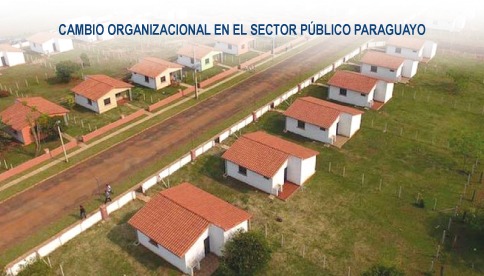
Overall objective of the project
Identify the key factors that enable (or prevent) organizational change that increases efficiency in public management in Paraguay. Specifically, this research will focus on the National Secretariat for Housing and Habitat (SENAVITAT), a large public organization in Paraguay that plays a major role in the social policy of the Paraguayan government.
ORGANIZATIONAL CHANGE IN THE PARAGUAYAN PUBLIC SECTOR
In 2016, the ID in association with the University of Buenos Aires (UBA) presented to the National Council of Science and Technology (CONACYT) the proposal of associative research Determinants of Organizational Change in the Paraguayan Public Sector: The case of SENAVITAT within the framework of the Paraguayan Program for the Development of Science and Technology (PROCIENCIA), which was approved by CONACYT and began its implementation in January 2017. The objective of PROCIENCIA is to strengthen national capacities for scientific research and technological development, so as to contribute to increasing productive capacity, competitiveness and improving living conditions in Paraguay.
Specific objectives
- Identify the institutional challenges of SENAVITAT in Paraguay in the context of organizational change in public administration in developing countries;
- Identify the set of conditions that contribute most (or least) to increase efficiency in public management in the Paraguayan context;
- To identify the catalysts (or inhibitors) for the adoption of new information, communication and process technologies in the Paraguayan public sector that is characterized by a complex regulatory context;
- Contribute to the theory of organizational change in governance in developing countries.
Expected products
- Revised literature on the determinants of organizational change in the public sector in developing countries and the institutional challenges of SENAVITAT.
- The current institutional strategic plan of SENAVITAT and the main management indicators are revised. Improved to the level of operators, with management indicators that allow measuring the success or failure of its implementation and the conditions in which public management is developed.
- Dissemination and commitment to the new strategic plan throughout SENAVITAT.
- Management monitoring system implemented to gather timely information on the qualitative evaluation of the catalysts for success (or failure) in increasing institutional effectiveness.
- Systematization of the study to determine the lessons learned from the SENAVITAT exercise that can identify good and bad practices in governance in Paraguay and in developing countries.
- Wide dissemination of the study in the national and international academic community; as well as among the country’s public managers.